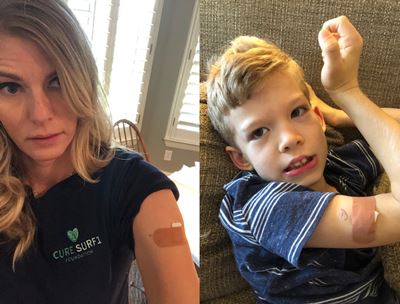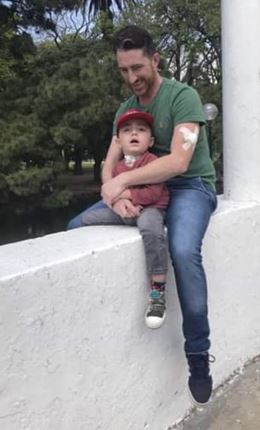 |
| Kasey Woleben and her son Will |
The mission was clear. Kasey Woleben needed to collect dozens of skin punches from members of her group, Cure Mito Foundation (formerly known as Cure SURF1), and she needed to get fibroblast cells from those samples safely to the University of Texas Southwestern Medical Center. Researchers there had been working on a potential gene therapy treatment and it was vital to have the cells to prepare an application to the FDA.
Unsure of where to start, Woleben turned to Coriell in September of 2020. Within just a few short months of bringing Coriell into the mix, the researchers had the cells in hand.
“Without Coriell, we wouldn’t be filing our IND (Investigative New Drug) application this year. We are very blessed and cannot thank Coriell enough,” Woleben said.
Woleben formed her organization in 2018 after connecting with other families affected by the mitochondrial disease Leigh syndrome. Symptoms of Leigh syndrome include a loss of motor skills, developmental delays, and trouble gaining weight. Woleben’s nine-year-old son, Will, had been diagnosed with the disease years earlier—Will’s version is caused by a mutation on his SURF1 gene—and her family wanted to do all that was possible to push for a cure.
That led Woleben to UT Southwestern. A team there was launching a new gene therapy program and—after some lobbying from Woleben—they felt this gene was a good candidate for genetic therapy. Her group raised more than $1 million for research, making it possible for the preclinical work to begin.
But the request last year for fibroblasts was a hurdle. Having them would strengthen the case for the IND application, but the families Woleben works with are from all around the world. How was the group going to collect dozens of skin punches from all over and get them safely to Dallas, Texas?
 |
| Lucio Barral and son Benito |
“We realized Coriell can help us collect these samples and save us a lot of money doing so,” she said. “Coriell is internationally connected which really matters when patients are around the world.”
Coriell houses the NIGMS Human Genetic Cell Repository, a diverse collection of research resources that includes samples representing more than 1,000 rare, heritable diseases. To build this collection, the NIGMS team at Coriell works with patients, families, and rare disease organizations to collect blood and skin samples for research.
The team at Coriell knew it could help. Shortly after being contacted by Woleben, Coriell’s Sherryann Wert, a Senior Project Manager on the team, hosted a webinar with Woleben, the researchers, and the families, so everyone could learn why these cells were important and how the donation process would work.
Coriell then sent sample collection kits to nearly 40 people spread across nine countries. Those individuals had skin punches taken and followed Coriell’s instructions to return them. Woleben and her family were the first donors, and they documented the process with photo and video to help others. Coriell was available for questions at any time.
Nearly every skin punch was viable when received by Coriell.
“On top of monitoring shipments and culturing the samples into usable fibroblasts, a great deal of clinical data was collected as well. That information was translated, organized, and all relevant information was included and reviewed,” said Wert. “This was a real team effort at Coriell.”
Researchers at UT Southwestern started receiving the fibroblasts in February. Now, Woleben and her organization are preparing their application for a gene therapy they hope will help her son Will—the fourth grader and die-hard fan of the Pittsburgh Penguins—and the dozens of others with the same mutation.
“Coriell understood our timeline needs,” Woleben said. “Without the fibroblasts, I don’t know where I’d be. I can tell you that.”